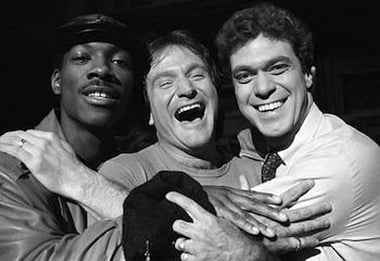
Robin Williams, center, with Saturday Night Live cast members Eddie Murphy, left, and Joe Piscopo, Feb. 10, 1984.
(AP Photo/Suzanne Vlamis)
BenefitsPro:
Robin Williams is dead.
Apparently he took his own life. The early reports are that he’d battled depression most of his life. And from what it sounds like, he lost.
Sure, it might not seem that big a deal to most, but I grew up with this guy.
(It’s funny. As a kid I often wondered why my elders cared so much about celebrity deaths. I was in the principal's office — of course — when I’d heard Elvis died. Everyone seemed so shocked and I all could wonder was, “Who’s he?”)
But now I understand. I grew up watching “Mork and Mindy.” (Yeah, I’m that old.) I even had a pair of those awful rainbow suspenders — remember, this was long before gay pride. His manic, improvisational style of acting spoke to me even at an early age.
See, I was one of those manic kids myself. I couldn’t sit still. Sarcasm was my second language. And jokes were all I had. They just came naturally. More than a few times I found myself in the principal’s office because I simply couldn’t sit still and shut up. Hell, these days I’d have been so doped up on one (or more) of the various kid-tamers that I would have slept-walked through my childhood.
So, early on, I identified with him. From those early days as Mork, to that Vietnam War DJ to his brilliant and mostly improvised — and brilliant — role as Aladdin’s genie, this was someone I could relate to.
Of course, it wasn't until last year that I realized that I’d been battling depression myself— for probably a lot longer than I ever realized. Or even still am able to acknowledge. I suppose humor was the only weapon I thought I had.
I think I’m doing better. I’m taking my meds. My diet’s a helluva lot better. And I really am trying my best with the gym, but it’s so easy to let other things take priority. My boss has been doing double-duty as my therapist. And my wife has been my rock. I wouldn’t be here without her.
But when I see news like this, about someone else plagued by demons so much like my own, it shakes me to my core. If he can’t handle it — with access to the best health care money can buy — how the hell am I supposed to? What chance do I have?
Then I look at my three kids, who still see me as someone worth emulating, and loving unconditionally, and I can’t even fathom not being there for them. And I look at my wife, whose patience would drive Job to the nearest bar (or shrink).
I met a broker friend of mine for drinks a couple of weeks back, and (of course) we talked about work. He mentioned that no matter how hard his job is, he never gets called the names I do on a weekly (sometimes daily) basis. He doesn’t have outraged readers (or clients) calling his CEO asking for his job or trolls calling him every sophomoric name they can dream up.
And it made me wonder why it never got to me. Then I realized: No one can call me anything I haven’t already called myself. When it comes to being one's own worst critic, I’m freakin’ Roger Ebert at a Jerry Bruckheimer premiere.
Which also makes me think: We’re so quick to demonize one another in this hyper-partisan age, but there’s no demon harder to exorcise than the ones inside us.
Rest in peace, Robin. Thank you for making this little boy’s own scattered mind make a little sense. I hope your demons have finally fled.
About the Author

Denis Storey is editor for BenefitsPro.com and Benefits Sellingmagazine. He can be reached at dstorey@benefitspro.com.












